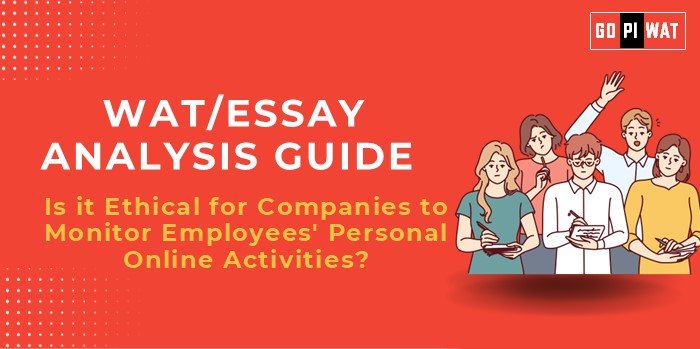📋 WAT/Essay Analysis Guide: Is it Ethical for Companies to Monitor Employees’ Personal Online Activities?
🌟 Understanding the Topic’s Importance
This issue is pivotal for B-school students, merging ethics, technology, and organizational behavior. It fosters critical thinking on balancing corporate goals with human values.
⏳ Effective Planning and Writing
- 📝 Time Allocation:
- Planning: 5 minutes
- Writing: 20 minutes
- Review: 5 minutes
- 📚 Preparation Tips:
- Gather statistics on monitoring and employee rights.
- Note key stakeholders and global legal contexts.
📖 Introduction Techniques for Essays
- ⚖️ Contrast Approach: “While workplace productivity tools promise efficiency, they often blur the line between ethical oversight and personal privacy invasion.”
- 💡 Solution-Oriented: “Balancing ethical monitoring and employee privacy requires transparency, informed consent, and stringent data-use policies.”
📚 Structuring the Essay Body
1. Achievements:
- ✔️ Productivity Gains: Monitoring tools help improve efficiency and adherence to organizational goals.
- ✔️ Compliance Adherence: Ensures companies meet industry-specific regulations like financial audits.
- ✔️ Employee Feedback Loops: Provides data to offer targeted feedback for performance improvement.
2. Challenges with Comparative Analysis:
- ⚠️ Privacy Concerns: Employees often feel their personal boundaries are infringed upon.
- 🌍 International Regulatory Frameworks: Compare stricter GDPR laws in Europe with relatively lax US policies.
3. Future Outlook:
- 🌟 Recommend employee-centered policies like opt-in monitoring.
- 💡 Leverage technology for greater transparency, such as dashboards showing collected data and its usage.
🔚 Concluding Effectively
- 🌀 Balanced Conclusion: “Employee monitoring, while beneficial for organizations, requires a principled approach balancing rights and responsibilities.”
- 🌍 Global Perspective: “Drawing from GDPR-like frameworks can set benchmarks for ethical corporate practices.”
📈 Analyzing Successes and Shortcomings
- ✔️ Achievements: Enhanced security and measurable productivity gains.
- ❌ Challenges: Trust erosion among employees and ambiguous legal boundaries in some regions.
- 🌎 Global Context: Contrast the EU’s GDPR with the USA’s employer-centric policies to highlight gaps.
📋 Recommendations for Sustainable Progress
- ✔️ Enforce legal transparency in monitoring practices.
- ✔️ Develop opt-in policies for employees to provide consent.
- ✔️ Conduct regular audits of monitoring tools for ethical adherence and compliance.
✍️ Sample Short Essays
1. Balanced Perspective:
“Monitoring ensures workplace security but raises ethical questions about employee privacy. A transparent, consent-based approach can bridge this divide.”
2. Solution-Oriented:
“Ethical monitoring must empower employees with opt-in choices and clear disclosures to foster a culture of trust.”
3. Global Comparison:
“Adopting GDPR-like frameworks ensures that monitoring practices respect individual rights while serving corporate objectives.”


